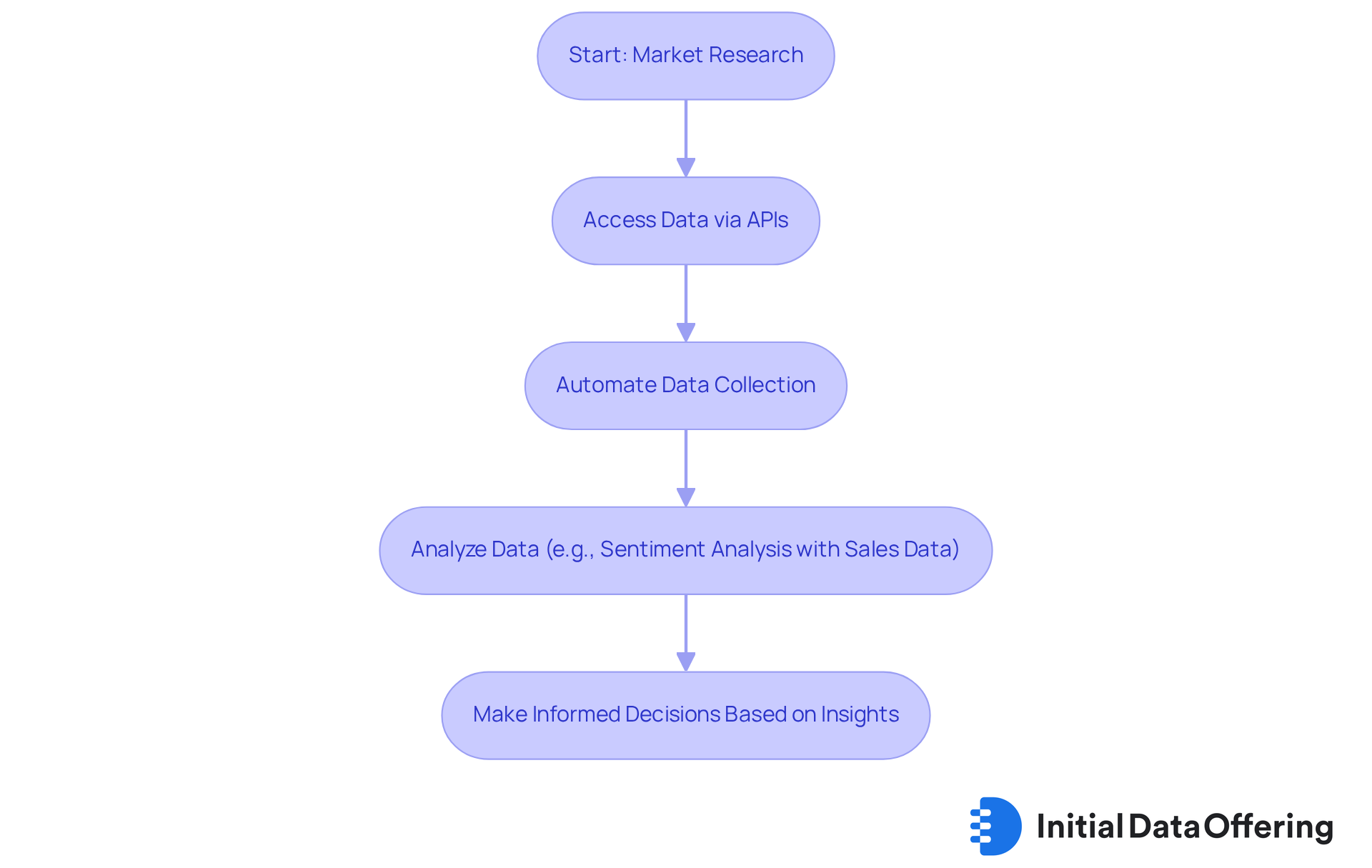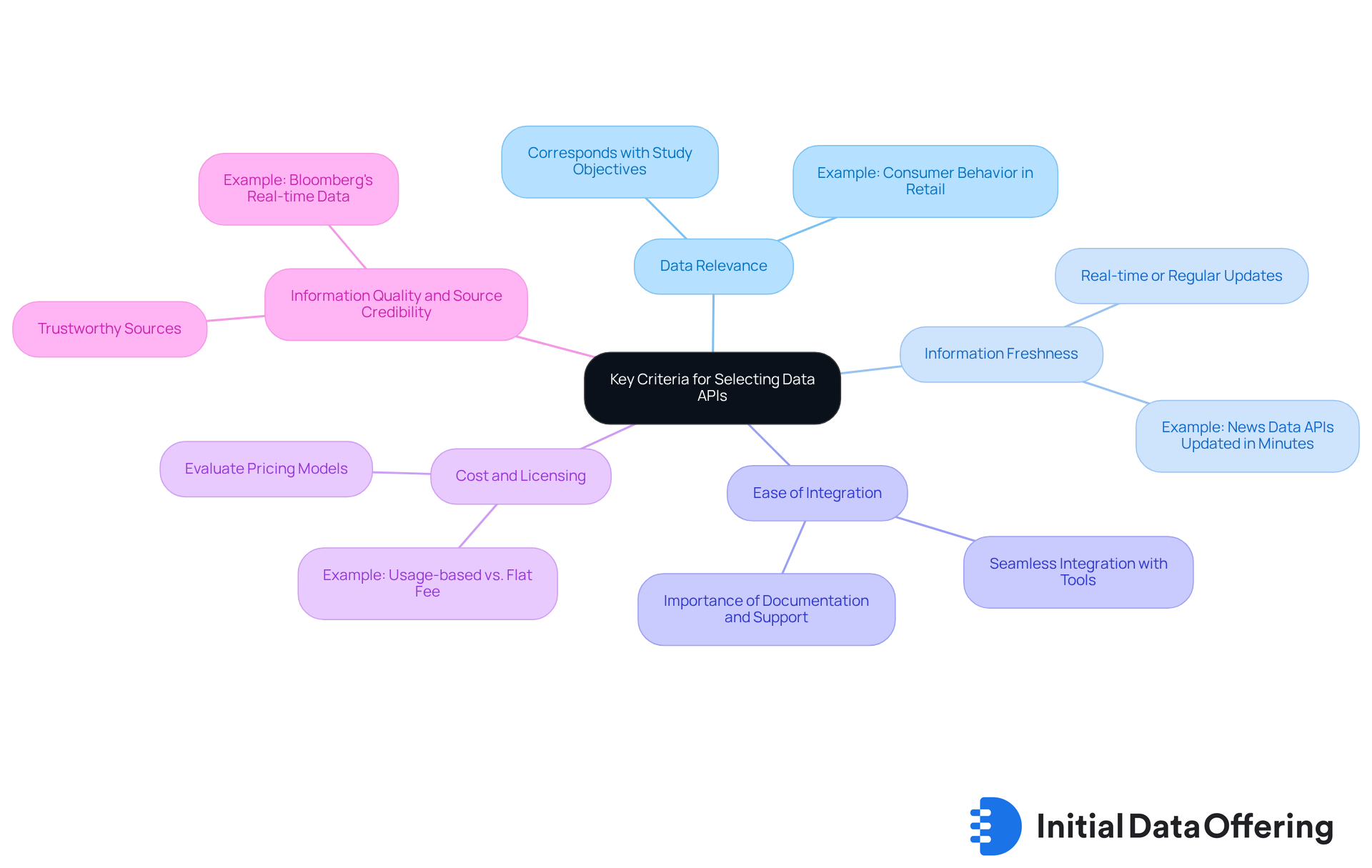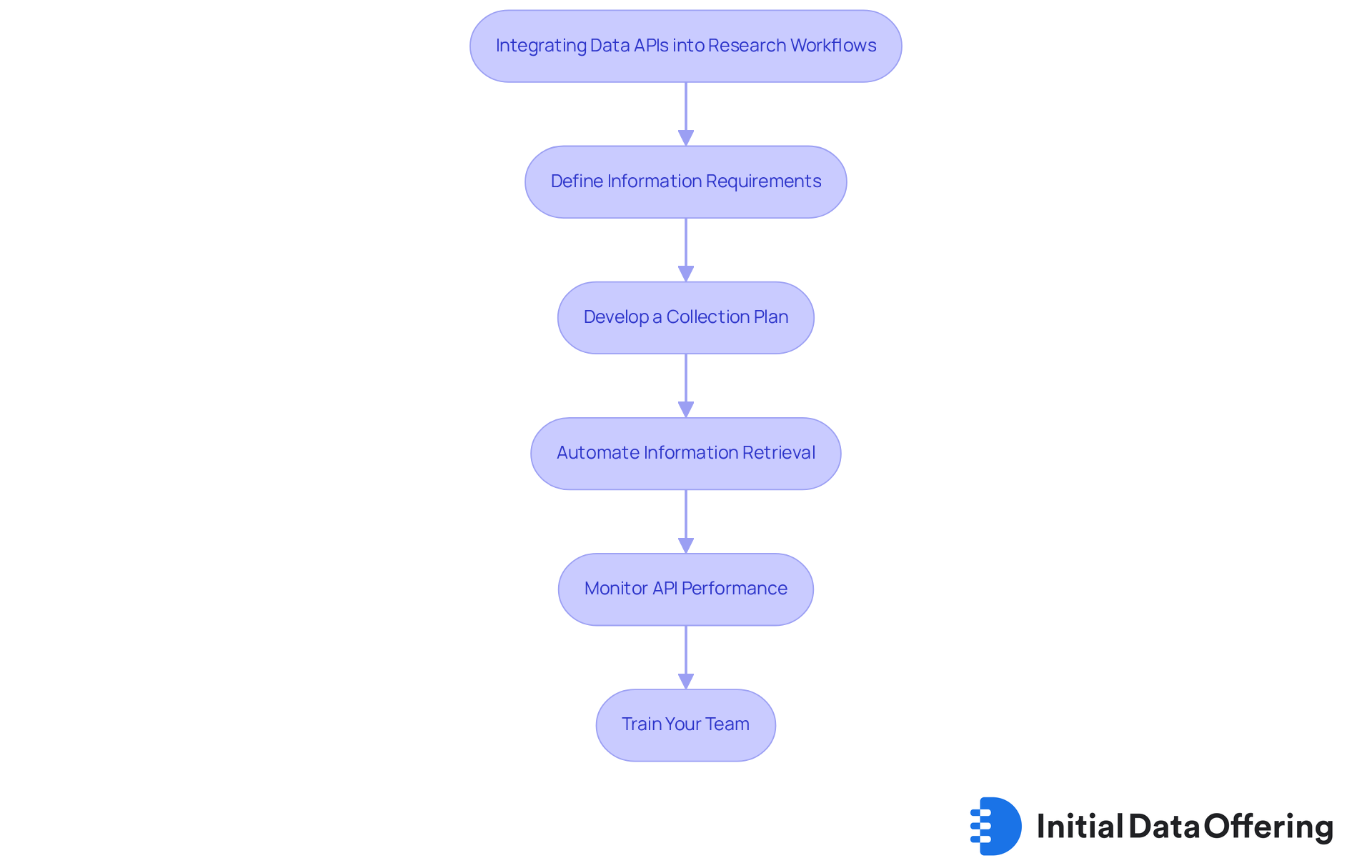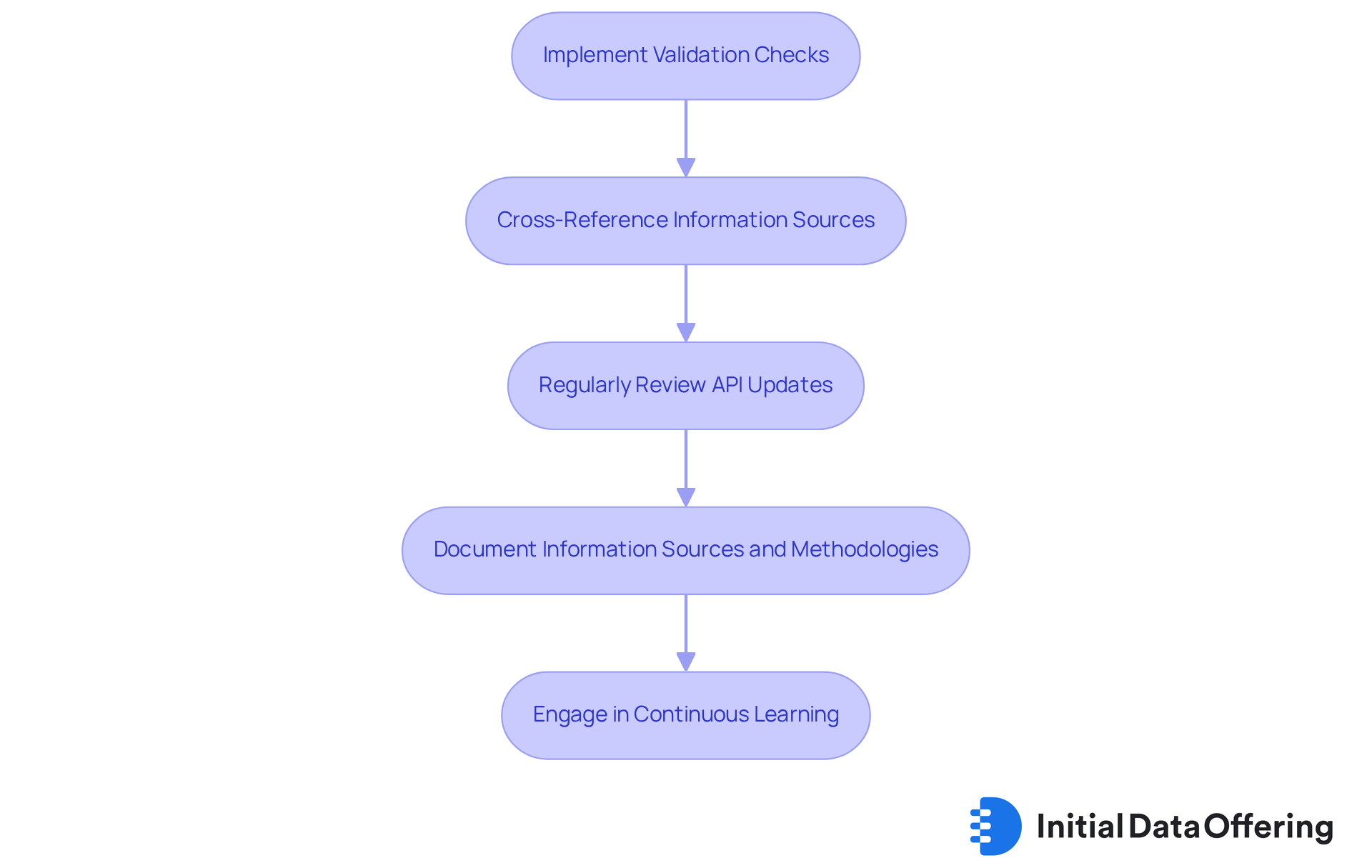Mastering Company Data APIs for Effective Market Research

Mastering Company Data APIs for Effective Market Research
Overview
Mastering company data APIs is crucial for effective market research. These APIs facilitate seamless access to diverse datasets, which enables researchers to automate information collection. This automation enhances analysis precision, allowing for more informed decision-making. The advantages of utilizing APIs are clear: they streamline data integration and improve decision-making processes. Ultimately, this leads to driving innovation and gaining a competitive advantage in the market. How can your organization leverage these APIs to enhance its market research efforts?
Introduction
In the rapidly evolving landscape of market research, the integration of company data APIs stands out as a significant advancement. These APIs offer researchers the ability to access vast reservoirs of information with unprecedented ease. By automating data collection processes, organizations can ensure timely access to critical insights that inform strategic decision-making.
However, as the reliance on these tools increases, so does the challenge of selecting the right APIs and maintaining data quality. How can researchers navigate this complex terrain to maximize the benefits of data APIs while safeguarding the integrity of their findings?
Understand Data APIs and Their Role in Market Research
APIs (Application Programming Interfaces), such as the company data API, are essential conduits that facilitate seamless communication between various software applications, particularly in market research. These company data APIs enable researchers to access extensive datasets from diverse sources, such as social media platforms, financial databases, and consumer behavior analytics. By utilizing Information APIs, researchers can automate their information collection processes, ensuring access to the most current and relevant insights. This automation not only saves valuable time but also significantly enhances the precision of market analyses, enabling businesses to make informed decisions based on real-time information trends.
For example, consider a market researcher who employs an API to compile social media sentiment data. This information can then be analyzed alongside sales figures, providing a comprehensive assessment of a marketing campaign's success. The integration of these data sources enriches the insights available, allowing for a more nuanced understanding and strategic planning.
As we approach 2025, the importance of the company data API in market analysis is set to grow, as stakeholders increasingly demand actionable insights that directly link to business outcomes. Industry leaders assert that effective access to datasets through APIs is vital for driving innovation and sustaining a competitive edge in a rapidly changing market landscape.

Evaluate Key Criteria for Selecting Data APIs
When selecting Data APIs for market research, several key criteria should be evaluated:
-
Data Relevance: It is essential to ensure the API provides access to datasets that correspond with your study objectives. For example, if your focus is on consumer behavior in the retail industry, a company data API that collects sales information from various retailers would be indispensable. This relevance is crucial, as nearly 80% of businesses conduct market research to gather targeted insights.
-
Information Freshness: Choose APIs that provide real-time or regularly updated information. In fast-moving markets, trends can change quickly, making timely information essential for precise analysis. Typical news data APIs are updated in near real-time, often within minutes of publication, ensuring users have access to the most recent information.
-
Ease of Integration: The company data API should seamlessly integrate with your current analysis tools and workflows. Comprehensive documentation and robust support are vital for facilitating smooth integration, which can significantly enhance operational efficiency.
-
Cost and Licensing: Evaluate the pricing model of the API. Some may charge based on usage, while others might offer a flat fee. It is essential to confirm that the cost corresponds with your budget and expected return on investment, particularly noting that over 85% of companies indicate that market analysis ROI exceeds four times the investment.
-
Information Quality and Source Credibility: Examine the origins of the information supplied by the API. High-quality information from trustworthy sources improves the credibility of your findings. For instance, APIs such as Bloomberg's provide real-time financial market information, which is essential for informed decision-making in financial analysis.

Integrate Data APIs into Research Workflows Effectively
Incorporating company data APIs into your investigative workflows can significantly enhance both efficiency and information precision. To maximize these benefits, consider the following effective strategies:
-
Define Your Information Requirements: Begin by precisely detailing the specific information necessary for your study and its intended application. This foundational step will guide your API selection and integration process, ensuring alignment with your research objectives.
-
Develop a Collection Plan: Create a structured strategy that outlines how and when information will be gathered through the API. Scheduling regular information extractions is crucial for maintaining access to the latest details, which is essential for timely insights.
-
Automate Information Retrieval: Implement scripts or tools to automate the information retrieval process from the API. Automation decreases manual effort and lowers the risk of mistakes, allowing researchers to focus on analysis rather than information gathering. Significantly, a recent survey revealed that over 60% of researchers are now automating information retrieval from APIs, reflecting a growing trend towards efficiency in collection.
-
Monitor API Performance: Regularly assess the performance of the API to ensure it operates as expected. This includes overseeing changes in information availability or API endpoints, which can directly influence your findings.
-
Train Your Team: Provide training for all team members engaged in studying effective API usage. This fosters teamwork and ensures that everyone is aligned regarding information management practices, ultimately improving overall study quality. As highlighted by a market analysis expert, "Effective training on API usage is essential for maximizing the advantages of automated data collection."
By following these strategies, researchers can effectively utilize APIs to streamline their workflows and enhance the quality of their insights. Moreover, examples of successful API integration in market research, such as the case of Company A, which achieved a 35% reduction in operational costs through effective API utilization, illustrate the practical benefits of these strategies.

Ensure Data Quality and Accuracy in API Utilization
To ensure data quality and accuracy when utilizing Data APIs, consider implementing the following practices.
-
Implement Validation Checks: Establish protocols to verify the information received from the API. This includes checking for missing values, duplicates, and inconsistencies. By doing so, you enhance the reliability of the data you work with.
-
Cross-Reference Information Sources: Whenever feasible, cross-check the information obtained from the API with other trustworthy sources to confirm its precision. This practice adds an additional layer of credibility to your findings, ensuring that your decisions are based on accurate data.
-
Regularly Review API Updates: APIs may undergo changes that can influence their structure or availability. Staying informed about any updates from the API provider allows you to modify your information-gathering processes accordingly, thus maintaining the integrity of your data.
-
Document Information Sources and Methodologies: Keep detailed records of where the information originates and how it was gathered. This transparency is crucial for validating your research and serves as a reference for future inquiries.
-
Engage in Continuous Learning: Stay updated on best practices in data management and API utilization. Participating in workshops or training sessions can significantly enhance your skills and knowledge in this area, ultimately benefiting your professional development.

Conclusion
Mastering the use of company data APIs is pivotal for conducting effective market research in today's data-driven landscape. These powerful tools offer researchers access to a wealth of information that streamlines data collection and enhances the quality and relevance of insights derived from that data. By automating processes and integrating diverse datasets, businesses can make timely, informed decisions that significantly impact their competitive edge.
The article highlights several critical aspects of utilizing data APIs:
- Selecting the right APIs based on relevance, information freshness, integration ease, cost, and data quality is essential.
- Effective strategies for integrating these APIs into research workflows include:
- Defining information requirements
- Automating data retrieval
- Ensuring data accuracy through validation checks
These practices maximize the benefits of API usage. Real-world examples underscore the tangible advantages of these practices, showcasing how organizations can achieve substantial improvements in operational efficiency and insight generation.
Ultimately, embracing data APIs is not merely about keeping pace with technological advancements; it is about harnessing the potential of real-time data to drive strategic decisions. As the market continues to evolve, the ability to access and analyze relevant information swiftly will be a defining factor for success. Researchers and businesses alike are encouraged to adopt these best practices and remain vigilant in their pursuit of data quality and accuracy. How can these insights be applied to your own work? By ensuring they are well-equipped to navigate the complexities of modern market research, organizations can secure their position in a competitive landscape.
Frequently Asked Questions
What are data APIs and why are they important in market research?
Data APIs (Application Programming Interfaces) are essential tools that facilitate communication between software applications, allowing researchers to access extensive datasets from various sources. They are important in market research as they enable seamless data collection and integration, enhancing the accuracy and efficiency of market analyses.
How do company data APIs assist researchers?
Company data APIs help researchers automate their information collection processes, ensuring access to current and relevant insights. This automation saves time and improves the precision of market analyses, enabling businesses to make informed decisions based on real-time information trends.
Can you provide an example of how an API is used in market research?
An example of API usage in market research is when a researcher compiles social media sentiment data through an API. This data can then be analyzed alongside sales figures to assess the success of a marketing campaign, providing a comprehensive understanding of its impact.
What is the expected trend for company data APIs as we approach 2025?
As we approach 2025, the importance of company data APIs in market analysis is expected to grow. Stakeholders will increasingly demand actionable insights that directly link to business outcomes, making effective access to datasets through APIs vital for driving innovation and maintaining a competitive edge.